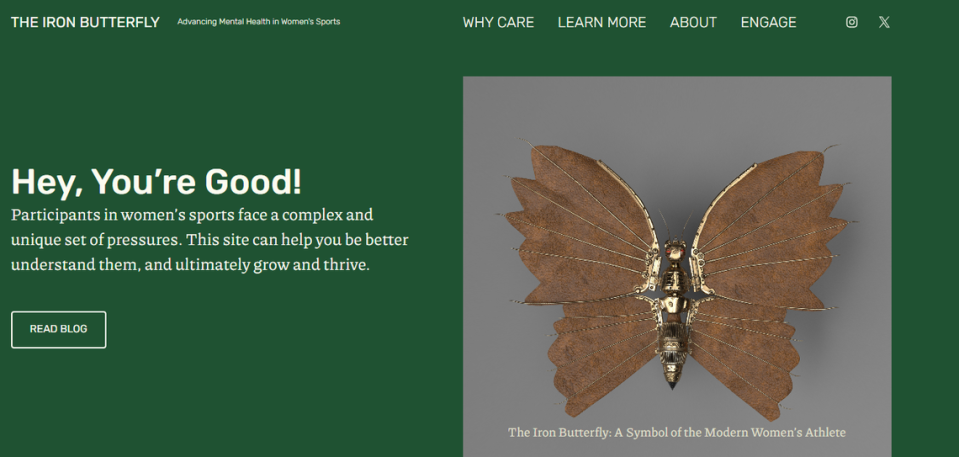Women in sports often face mental health challenges. A Boise teen’s website offers help
Sydney Garber is as driven as a high school student athlete can possibly be.
The senior-to-be at Capital High, a softball pitcher, holds a 4.2 GPA and was named to the Southern Idaho Conference honorable mention team. She’s a founding member of the National Charity League in Idaho, serving as vice president of programs and philanthropy.
She’s already talking to college softball coaches and hopes to continue her playing career at the next level while earning a degree.
Garber also is a teenager who has struggled at times with anxiety, self-induced pressure and the pitfalls of stretching herself too thin.
“I’ve had maybe one female coach in my entire career,” Garber told the Idaho Statesman in an interview. “It’s just difficult to struggle, like the academic side of things, alongside the athletics, all the pressure, and for me, I struggled with anxiety, and just having enough time for everything was really hard for me.”
While on a recruiting trip on the East Coast, Garber talked to an NCAA softball coach about the importance of mental health in athletics — specifically for women. The coach told Garber how much she prioritizes it for all her athletes.
That conversation inspired Garber to do research into what mental health resources were available to high school athletes.
The results shocked her, and she decided to do something about it.
“I was looking more into it and I realized there’s not really any forums or like a place where all these resources can be compiled and looked at,” she said.
Garber got to work creating and designing a first-of-its-kind website that would house mental health resources specifically catered to women in athletics. With the help of sports psychologists and the Association for Applied Sport Psychology, Garber’s website, The Iron Butterfly, is now up and running.
Garber hopes to provide female athletes across all levels a space where they can connect and discuss what they’re struggling with, while gaining access to resources targeted to their specific needs.
“I just found a lot of women actually suffer more with mental health than male athletes,” Garber said. “That might be undiagnosed, but it could also have something to do with social media and expectations, and having specific diets or weightlifting. Just getting that female perspective.”
Garber came up with the name for the project when her grandmother was in town to watch her play softball. Her grandmother told her she looked like an iron butterfly while she was on the field.
“I was like, ‘grandma, what does that mean? I don’t get it,’” Garber said. “And she said, ‘You guys are very strong on the inside but very pretty and graceful on the outside.’ And that to me symbolizes strong women who balance grace and grit, so I think it’s a summary of what a female athlete is like on the inside and on the outside.”
Iron Butterfly website
The Iron Butterfly website is filled with facts and statistics about mental health for female athletes, and includes a list of resources all in one location, such as videos, articles, books and reports. They all highlight women who have experienced mental health struggles.
The site also includes a comment section for readers to leave their experiences, a mental health blog and an information tab that explains the significance of mental wellness in women’s sports.

Hillary Cauthen, a sports psychologist and owner of Texas Optimal Performance and Psychological Services, was instrumental in helping compile the resources for the website, Garber said.
Cauthen, who was a track athlete at the University of New Hampshire and Miami (Ohio), said she understands the need for a supportive and connecting space among female athletes.
“Navigating the competitive sports environment is particularly challenging for female athletes, who must contend with intense pressures, external expectations and unique stressors,” Cauthen wrote in an Iron Butterfly news release this week. “I understand how balancing performance demands with personal well-being often leaves little room for addressing mental health.”
People close to Garber — such as Colette Roberts, her pitching coach at Capital and a former pitcher at the University of New Mexico — aren’t shocked to see the teen taking thoughtful initiative and looking for ways to help those like her.
Earlier this year, Garber designed T-shirts for all of the team’s seniors — without anyone asking her to, Roberts said.
“She’s super genuine, super thoughtful,” Roberts said. “She always goes out of her way to find very sentimental things for everyone. She’s a very caring person.”
Roberts also works in the attendance office at Capital, which allows Garber to stop by and chat. The two have formed a tight-knit relationship, and Roberts said she is thankful to be someone Garber can turn to if she’s struggling — on the field or off.
“She has someone through me,” Roberts said. “She has someone that she can talk to and she gets to open up about her thoughts.
“We go over game stuff, we go over pitching stuff. She tells me everything she thinks about the game, and I feel I can tell her what she needs to work on.”
Garber said her ultimate goal is to contribute to the broader national discussion surrounding mental health for women in sports. If she can help them feel more content and comfortable, then her mission will be accomplished, she said.
“I just really want to stress the importance of a platform for women in mental health and athletics,” Garber said. “That is the main purpose of this project. Just to get the word out.”

 Yahoo Sports
Yahoo Sports 
